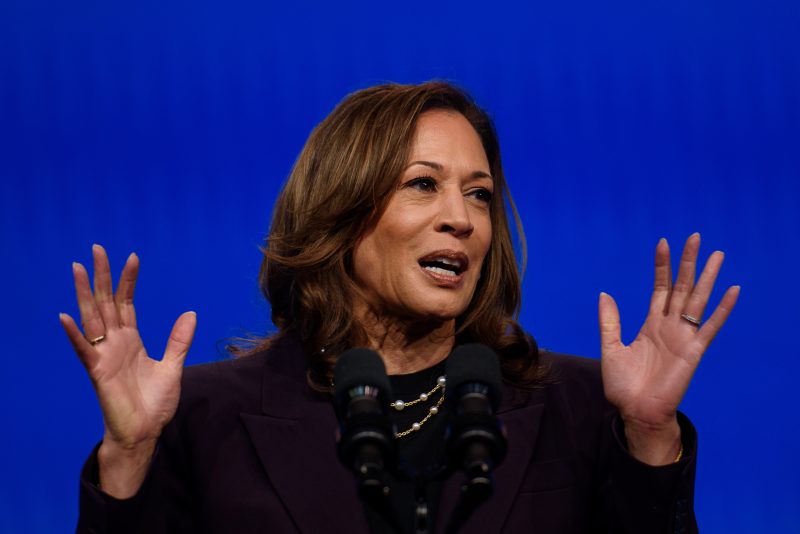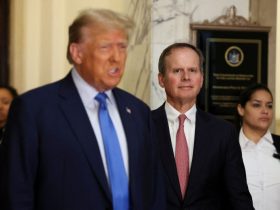Vice President Harris is in a two-week sprint to lock in a running mate after President Biden’s stunning decision to end his reelection campaign, a search that suddenly elevates the potential political assets — and vulnerabilities — of the Democratic Party’s bench.
Harris is considering roughly a dozen potential vice-presidential candidates, though allies say three have risen to the top: Pennsylvania Gov. Josh Shapiro (D), Sen. Mark Kelly (D-Ariz.) and North Carolina Gov. Roy Cooper (D). The allies, who spoke on the condition of anonymity to discuss a confidential process, cautioned that the process is in its early stages and that Harris’s aides are still mulling an expansive group of contenders.
The process officially got underway Tuesday, and Harris plans to make a decision by Aug. 7, aligning with the national party’s plan to virtually nominate a ticket by then.
“She has a lot of great people to choose from,” Cooper told The Washington Post on Thursday, declining to comment on his own interest. “She has to win. I want her to win. I want her to pick the person that can help her win. I respect her process, and I don’t want to comment on that process.”
During local news conferences and cable news appearances, potential vice-presidential candidates have spent recent days playing coy about their intentions while also testing out lines of attack against Republican nominee Donald Trump and his running mate, Sen. JD Vance (R-Ohio). Some will get a chance to audition on the campaign trail in the coming days — including Shapiro, who is set to co-headline a Harris campaign event Monday in Pennsylvania.
Among those navigating the new and intense speculation is Kentucky Gov. Andy Beshear (D). During a news conference Thursday in his home state, Beshear began taking reporters’ questions by proactively addressing what he said he believed would be “likely to be asked over and over again.”
“I am honored to be considered and regardless of what comes next, I’ll do everything I can between now and Election Day to elect Kamala Harris as the next president of the United States of America,” Beshear said.
The decision is an early and major test for Harris’s days-old presidential campaign. Biden picked her as his running mate in 2020 because he wanted someone who shared his values and could immediately be effective on the job — and Harris is said to be approaching the search similarly.
Harris initially considered some military and business leaders, though one of them, retired Navy Adm. William McRaven, said Wednesday that he had removed his name from consideration. And while she is thinking about some female politicians, her shortlist overwhelmingly contains White men, reflecting assumptions that voters would prefer gender and racial balance with a Black women leading the ticket.
“Vice President Harris has directed her team to begin the process of vetting potential running mates,” Harris campaign spokesperson Kevin Munoz said in a statement. “That process has begun in earnest and we do not expect to have additional updates until the Vice President announces who will be serving as her running mate and as the next Vice President of the United States.”
Many Democratic Party leaders are giving Harris space to make her decision and declining to publicly offer their preferences. But some local and state parties and individuals have formally backed potential vice-presidential nominees from their area, including in Arizona, Pennsylvania and North Carolina.
“The path to the White House runs through Arizona, and we are confident that with Kamala Harris and Mark Kelly at the top of the ticket, Democrats will win in November,” Arizona’s party chair, Yolanda Bejarano, said in a statement.
Rep. Angie Craig (Minn.), among the earliest House Democrats to call on Biden to step aside, is openly pushing for her state’s governor, Tim Walz.
At the same time, the potential running mates are suddenly seeing their records scrutinized by fellow Democrats.
Kelly on Wednesday sought to neutralize one of his political vulnerabilities, making clear he supports the Pro Act, which would ease the path toward forming unions and winning labor contracts. Kelly has drawn scrutiny from labor groups because he is one of the few senators who caucus with Democrats who has not signed on to that legislation over the years.
Harris shouted out the Pro Act during a trip to Houston on Thursday. Addressing the American Federation of Teachers, Harris said Biden had promised to sign the legislation into law if it reached his desk — and “I promise you I will keep that promise.”
During a Democratic National Committee media call Thursday with union leaders, reporters asked whether there were concerns over Kelly being considered for the vice-presidential slot. Abhi Rahman, a DNC spokesman, did not directly respond to the question, saying, “As a reminder, the DNC is still going through a process — an open and transparent process — to select our next nominee.”
The DNC Rules Committee approved a nomination process Wednesday under which virtual voting could start as soon as Aug. 1. DNC officials have long aimed to wrap up the process by Aug. 7 to avoid potential GOP litigation related to Ohio’s ballot certification deadline. Ohio lawmakers moved it back from Aug. 7 to accommodate Democrats, but Democrats say they do not trust the GOP-led legislature there and do not want to take any chances.
In Pennsylvania, Shapiro has sought to carve out a distinct ideological profile that includes some positions at odds with his party, including support for school vouchers, which tap tax dollars to send students to private schools. A coalition of pro-public education groups sent a letter to Harris on Wednesday asking her to not pick Shapiro.
Shapiro has also been an outspoken supporter of Israel after Hamas’s attack on the country last year, putting him at odds with some Democrats who want the United States to push back harder against the country’s war effort. At the same time, Shapiro, who is Jewish, has lined up with fellow Democrats in criticizing Israeli Prime Minister Benjamin Netanyahu, saying in January that he is taking Israel in the “wrong direction.”
“The things that Josh brings to the ticket, looking at it purely from an electoral contest standpoint, is accomplished governor of a swing state, absolutely relentless campaigner,” said Daniel Bauder, president of the Philadelphia Council AFL-CIO. “When Josh ran in ’22 for governor, he ran against a deeply unpopular Republican opponent, but he treated the race as if he were running neck-and-neck the entire time.”
Bauder said he did not think any party-splitting positions would necessarily be “deficiencies when examining Josh as a potential running mate.”
“Ultimately the platform is set by the party and the president,” Bauder said.
One consideration regarding Cooper is that under the North Carolina Constitution, the lieutenant governor becomes the acting governor whenever the governor leaves the state. That means that if Cooper were to be out campaigning for Harris, the acting governor would be Lt. Gov. Mark Robinson, a GOP firebrand running for governor.
Last year, while Cooper was traveling in Japan, Robinson used his temporary powers to declare a week of solidarity with Israel after the Hamas attacks on the country. Cooper responded critically, calling it a political stunt given Robinson’s history of antisemitic comments.
On Thursday, Cooper’s office argued that its legal analysis shows the governor’s powers “do not transfer to the Lieutenant Governor so long as the Governor is able to remain in communication and direct state government action when traveling.”
“If the Governor ceded official responsibility and authority during any physical travel outside North Carolina, it would lead to chaos and confusion,” Cooper spokesperson Sadie Weiner said in a statement.
Cooper, in a Post interview, said he has been able to manage the state “pretty well” while traveling as governor.
Chris Cooper, a political science professor at Western Carolina University, predicted that Robinson would not have that much impact as acting governor.
Chris Cooper noted Republicans in the state legislature already have veto-proof majorities, so there would be little political incentive for them to jam through a bill for Robinson’s signature while Roy Cooper is gone.
“The big 10,000-foot deal is the North Carolina governor is incredibly weak — arguably the weakest in the country — and a one-day governor is even weaker,” Chris Cooper said.
Mariana Alfaro contributed to this report.








